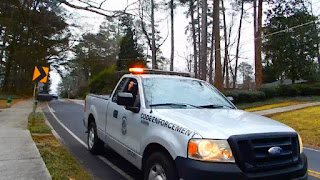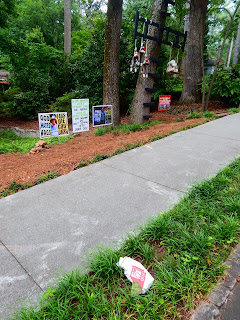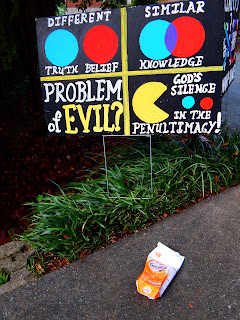Non-negotiated guilty pleas are where trial judges earn their pay. Most pleas are negotiated. The prosecutor and the defense attorney have agreed on the sentence in advance, and the judge’s role is limited to approving or rejecting it. Over 95% of the time, trial judges defer to the prosecutors and approve the plea bargain. Nevertheless, a trial judge's sentencing philosophy looms large in plea negotiations. Defendants do not agree to do hard time for their health or for the conversation of their prospective bunkmates. They do so out of fear that the judge would give them even more time if they were convicted at trial or entered a non-negotiated plea.
Willie F. is in his seventh decade, and has almost as many felony convictions. On March 25, he appeared in the Henry County Superior Court, his wrists and ankles shackled, indicted for burglarizing a shed.
The prosecutor, Assistant District Attorney Christina Kempter, recommended five years in prison. She tersely explained that the defendant had an extensive criminal history, including two burglary convictions, and argued that this justified the maximum sentence for second degree burglary. Willie’s attorney, Assistant Public Defender Whitney Gibbs, explained that her client was addicted to drugs and soon to become a father. She asked for probation and drug treatment so that her 62-year old client could meet his paternal obligations. After no more than a few hundred words from the attorneys, the Honorable Wade Crumbley began to earn his pay.
Judge Crumbley is a credit to the Georgia bench. Son of a Henry County landowner, a long-time Democrat, he was taunted on the elementary school playground because his parents supported President Johnson, who won passage of the Civil Rights Act. Crumbley had the intellect, the probity, and the tact to win appointment to the bench by a Republican governor. In 2006, he defeated Donnie Patton, a conservative city court judge, in an election where the Republican gubernatorial candidate won Henry County 62% to 34%. He ran unopposed in 2010 and 2014. Compared to his peers, Judge Crumbley is unusually patient. That Willie F.’s sentencing took no more than 15 minutes speaks volumes about the brisk pace of Georgia justice.
No evidence was introduced during the sentencing. The attorneys recited the facts informally and Willie occasionally answered questions. Judge Crumbley spoke more than either of the lawyers. He began by explaining that, when he was a lawyer, he often entered non-negotiated pleas and that people thought him brave because he was exposing his clients to the maximum sentence. After the prosecutor’s pithy recitation of Willie’s criminal history, Judge Crumbley asked when Willie’s first conviction occurred. The prosecutor browsed her file and said 1980. He asked when Willie’s most recent felony conviction was entered. The prosecutor first answered 2006 but, upon further review of her file, discovered that this was a misdemeanor shoplifting conviction and changed her answer to the early naughts. The judge asked if any of Willie’s convictions were violent. The prosecutor answered that he had twice been charged with aggravated assault. Willie chimed in that those charges had been dismissed and, upon further review of her file, the prosecutor agreed.
Judge Crumbley then turned to the facts of the case. Did Willie break into the shed, or did he just open the door? What did he steal? The prosecutor again leafed through her file. To her credit, she met the judge’s probing with candor. There were no signs of forced entry. Willie opened the door to a shed, stole a $200 air compressor, and put it in his truck. When he drove away, the property owner’s son followed him. For reasons that remain unexplained, Willie stopped his truck and gave back the air compressor. He was subsequently arrested on a warrant. It is unclear whether these facts, which are surely less heinous than a typical repeat burglary, would have come out but for Judge Crumbley’s persistent questioning.
The public defender was in a tight spot. Willie had insisted to her that the air compressor was just lying outside, and that he never entered the shed. His story contradicted the victim’s account, conveniently cleared its author of the burglary, and came from the lips of a repeat felon. A swearing contest between the property owner and Willie would have been an uneven fight, Willie probably would have been convicted of burglary, and the judge probably would have imposed a harsher sentence after a trial than after a guilty plea. On the other hand, denying guilt at the time you plead guilty is generally a bad idea. It suggests that you cannot admit your mistakes and that your only regret is being caught. I have never talked to Willie and don’t know how insistently he denied entering the shed.
Had I defended the case, I would have taken a field trip. Flotsam and jetsam grace many a Georgia yard. The shed may have been visible from the nearest road or from the driveway. It is perfectly legal to take pictures from a public street or to walk up to someone’s front door and talk to them. A surprising number of people will talk to a lawyer who rolls up unannounced, especially one wearing a seersucker suit. I would have taken some pictures of the yard from a lawful vantage point. If it was immaculate, these pictures would have showed Willie that his story was bull and made for a cleaner plea. If there had been tools scattered across the yard, they would have backed up Willie’s story, and turned his trial into a fair fight. The property owner might even have seen that her story could be impeached, become shy about going to court, and encouraged the state to offer a misdemeanor guilty plea.
A little investigation can go a long way, especially when no one is prone to believe your client. A motivated public defender can do this type of investigation. A public defender in Henry County might handle 20-25 cases a year that are as serious as Willie’s. (Roughly one in four cases in the Henry County Superior Court result in prison time, and the defense attorney knows the prosecution’s recommendation in advance). Driving out to a house one evening and taking some pictures might take an hour or two and is certainly more fun than sitting in your office.
Judge Crumbley finessed the complications created by Willie protesting his innocence to his attorney. The judge pointed out that, if Willie had just picked up a loose compressor, he would only be guilty of a misdemeanor and that he was pleading guilty to burglary. Willie acquiesced, and the plea went forward. It became a conversation between the judge and Willie.
The judge explained that it has become “politically correct” to impose shorter sentences than were once the norm. Those who want to “lock people up and throw away the key” have not so much changed their minds as seen the effects of their thinking on the budget. The judge asked Willie if he had gone to prison as a young man. Willie had. The judge asked if, after getting out of prison, Willie had found it hard to find work and had gotten into a cycle of poverty and addiction in which he could only get by through stealing. Willie agreed. The judge explained that it is late in the game for any “talking cure” to treat Willie’s addiction, and that he didn’t want to put Willie on probation because he thought Willie would just be back in court for a violation of probation. He sentenced Willie to a year in prison, with credit for the 56 days he had spent in jail awaiting his court date. Willie is unlikely to parole out before that sentence is over.
Judge Crumbley’s sentence is at the low end of what Georgia judges would impose, yet it is far more than a slap on the wrist. Willie deprived a family of its air compressor for a few minutes. He gave it back when confronted. He did not carry a weapon, did not hurt anyone, and doesn’t look very scary. He caused far less harm that a bank that makes abusive loans or an employer that offshores jobs. Yet Willie’s sins were crimes and easily proven ones at that. Despite Judge Crumbley’s humanity, locking Willie up for a year will cost the good people of Georgia at least $18,000, more if he requires serious medical care. Our sheds and air compressors will remain safe even if our homes and jobs remain precarious.





































